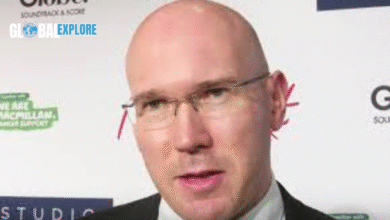Anne Carter Robertson Awards, Honors, and Professional AffiliationsIntroduction

Anne Carter Robertson stands as a significant figure in the world of musicology, known for her influential work in the study of medieval and Renaissance music. Her research, publications, and dedication to teaching have left an enduring mark on the academic community. Robertson’s scholarly contributions not only expanded the boundaries of historical musicology but also helped shape the curriculum and methodologies used in music studies today.
A scholar deeply rooted in tradition yet progressive in her approach, Anne Carter Robertson bridges the gap between past and present, bringing ancient compositions to life through rigorous academic inquiry. Her commitment to uncovering the intricacies of early music and illuminating its cultural context has made her work essential reading for musicologists, historians, and students alike. This article explores her early life, career, major contributions, and legacy, providing a comprehensive look at one of musicology’s most respected voices.
Early Life and Academic Background
Anne Carter Robertson’s passion for music was apparent from an early age. Born into a family that encouraged intellectual curiosity and artistic exploration, she was drawn to the structure and emotion embedded in music. Her early education included extensive training in both performance and theory, laying the groundwork for what would become a lifelong pursuit of musical scholarship.
Her academic journey began with undergraduate studies in music at a prestigious liberal arts institution, where she distinguished herself through her academic rigor and fascination with historical contexts. She continued her education with a Master’s degree and later a Ph.D. in musicology. During her graduate studies, Robertson’s interest gravitated towards medieval and Renaissance music, where she found a unique opportunity to combine her love for history, language, and music.
Mentored by some of the leading musicologists of the time, Anne Carter Robertson developed a critical lens through which she examined musical manuscripts, early notation systems, and compositional techniques of pre-modern composers. These experiences were instrumental in shaping her research focus and academic style. She emerged from her studies with a robust foundation in both the technical aspects of music theory and the interpretive frameworks of historical musicology.
Career Milestones and Professional Achievements
Anne Carter Robertson’s professional career is marked by a series of notable academic appointments and scholarly contributions. She began her teaching career at a prominent university, quickly earning a reputation as a passionate and effective educator. Her early lectures, often filled with original insights and a deep appreciation for historical context, captivated students and fellow academics alike.
Over the years, Robertson held several esteemed faculty positions at major research institutions, contributing significantly to their music departments. She was instrumental in developing comprehensive musicology programs that emphasized both analytical rigor and historical understanding. Her efforts were not confined to the classroom—she also served on numerous academic committees and editorial boards, furthering the reach of her influence in the field.
Robertson’s scholarly achievements include a wide range of publications, from peer-reviewed journal articles to critically acclaimed books. Her work has been cited extensively, reflecting her status as a thought leader in medieval music studies. She has also received multiple grants and fellowships, allowing her to delve deeper into research projects that uncovered previously overlooked aspects of early music.
Her affiliation with professional societies such as the American Musicological Society (AMS) and the Society for Music Theory (SMT) showcases her active participation in advancing the discipline. Robertson’s presentations at international conferences have been praised for their clarity, depth, and originality, often drawing large audiences of scholars eager to learn from her expertise.
Contributions to Medieval and Renaissance Music Studies
One of Anne Carter Robertson’s most profound impacts lies in her contributions to the study of medieval and Renaissance music. Her research focuses on exploring the evolution of musical forms, liturgical functions, and notational practices from the Middle Ages to the early modern period. Through her meticulous examination of manuscripts, Robertson has shed light on forgotten composers, undocumented musical traditions, and the socio-religious contexts that shaped early music.
Her expertise in Gregorian chant and early polyphonic forms has led to groundbreaking discoveries about how music functioned within medieval religious and courtly life. In particular, Robertson’s analysis of 14th-century motets has challenged conventional interpretations, offering new perspectives on the relationship between text and music during this period.
Her publications often delve into the technicalities of modal theory, rhythmic structures, and manuscript transmission, yet they remain accessible to a broad academic audience. By combining technical precision with historical narrative, she brings to life the lived experiences of medieval composers and performers. This approach has not only enhanced scholarly understanding but also inspired modern performances and recordings of early music.
In addition to her original research, Anne Carter Robertson has played a pivotal role in editing and translating medieval texts, making them available to a wider audience. Her annotated editions are widely used in both classroom settings and professional studies, cementing her reputation as a vital resource in the field of early musicology.
Influence on Music Education and Mentorship
Beyond her research, Anne Carter Robertson has significantly influenced music education through her teaching and mentorship. Known for her dynamic lectures and interactive teaching style, she has inspired countless students to pursue careers in musicology. Her ability to contextualize complex historical material in an engaging manner has made her a beloved figure among her students.
Robertson believes in nurturing curiosity and critical thinking. Her courses often incorporate original manuscript studies, collaborative projects, and performance-based analysis to help students connect with the music on a deeper level. Many of her former students have gone on to become respected scholars, crediting her guidance and encouragement as foundational to their academic growth.
She has also been actively involved in curriculum development, helping to shape musicology programs that reflect both the historical depth and modern relevance of the field. Her teaching materials, including syllabi, reading lists, and study guides, are widely circulated and adopted across institutions.
In addition, Anne Carter Robertson mentorship extends beyond formal education. She frequently supervises dissertations, advises early-career scholars, and participates in professional development seminars. Her holistic approach to mentorship—combining academic support with personal encouragement—has helped create a thriving community of young musicologists who carry forward her legacy of excellence and curiosity.
Public Engagement and Legacy
Anne Carter Robertson’s influence extends beyond academia into the broader public sphere. She has participated in numerous symposia, public lectures, and educational workshops, using these platforms to advocate for the relevance of historical music studies in today’s cultural landscape. Her ability to communicate complex ideas in an accessible way has made her a sought-after speaker at both academic and public events.
She has also been featured in interviews and panel discussions that explore the intersection of music, culture, and history. These engagements have allowed her to reach a wider audience and promote greater appreciation for medieval and Renaissance music. In doing so, Anne Carter Robertson has helped demystify early music for general audiences, encouraging more inclusive and informed musical discourse.
Her many accolades include lifetime achievement awards, distinguished teaching honors, and fellowships from leading institutions. These recognitions underscore the breadth of her impact and the respect she commands among her peers. More importantly, her work continues to inform new generations of scholars and musicians, ensuring that the traditions and insights of early music remain vibrant and evolving.
Robertson’s legacy is not merely in what she has accomplished, but in the doors she has opened for others. Through her scholarship, teaching, and advocacy, she has helped transform musicology into a more inclusive and interdisciplinary field, one that continues to grow thanks to her foundational contributions.
Conclusion
Anne Carter Robertson’s career embodies the spirit of scholarly dedication, educational excellence, and cultural preservation. Her work in medieval and Renaissance music has redefined the scope and methodology of musicological research. As a teacher, mentor, and public intellectual, she has left an indelible mark on the academic landscape.
From her early fascination with historical music to her role as a leading scholar in the field, Robertson’s journey is one of passion, precision, and perseverance. Her legacy lives on not only in her writings and teachings but also in the generations of students and scholars she has inspired. For anyone seeking to understand the richness of early music, Anne Carter Robertson’s work offers both a foundation and a path forward.
Also Read: Kathy May Fritz Face




